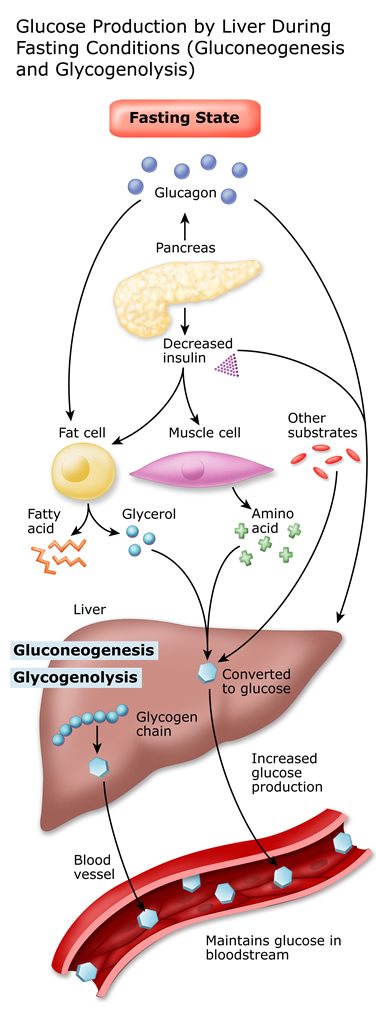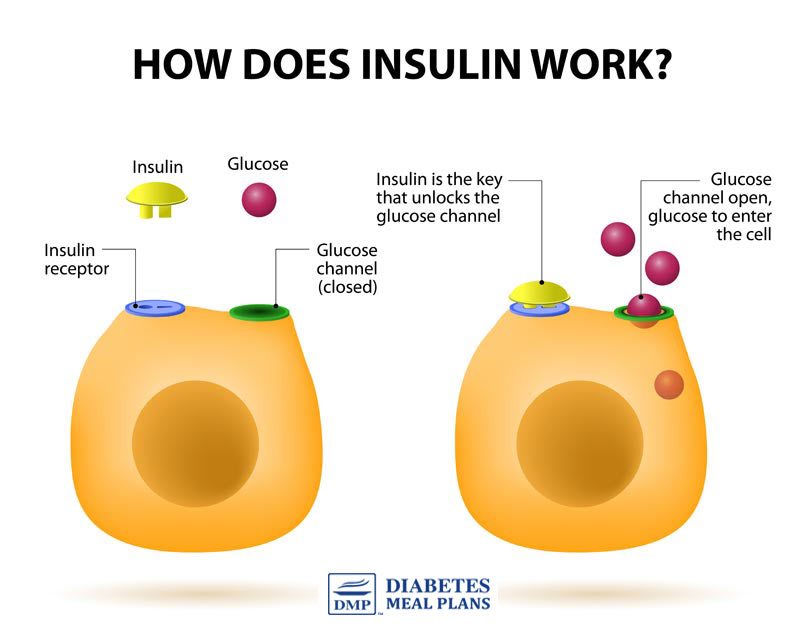Although it would seem logical that your body would have the lowest blood glucose level in the morning, this often isn’t the case for the following 6 reasons.
1. Glucose Happens 24/7
All the cells in the body need glucose to fuel their function, even when we sleep.
Therefore the liver can produce sugar (glucose) by breaking down body stores (glycogen), a process called glycogenolysis. The liver can also manufacture sugar (glucose) from amino acids (proteins) in a process called gluconeogenesis.

Image courtesy: University of California
These processes ensure the body and brain have adequate fuel so they can continue to go about their functions.
The point is: glucose production in the body will still occur when you don't eat or if you skip a meal because the body always maintains glucose at a certain level in order to function.
2. Hormones Raise Blood Glucose (the Dawn Phenomenon)
Around 3-4 am each morning, there are a collection of counter regulatory hormones that are signaled in the body: glucagon, epinephrine, growth hormone, and cortisol, which result in a rise in blood sugar.
This change in hormones occurs to stimulate our awakening, to get us moving and to give us energy. This is referred to as the Dawn Phenomenon or Dawn Effect.
This is in fact a ‘normal' response. This occurs in everyone, diabetic or not.
However, if you have diabetes or prediabetes there is one additional factor that impacts both the overnight glucose production and the rise in glucose with cortisol, and that is decreased insulin production or decreased utilization of insulin.
3. Decreased Insulin Production or Utilization of Insulin
Because most people with type 2 diabetes and prediabetes have either decreased insulin levels or decreased utilization of insulin, there is either not enough insulin being produced to bring the rising blood sugar levels down, even during the night when you are sleeping.
In this scenario, your body is still producing glucose, your hormones are still doing their thing, but insulin production is low so your body is unable to couteract the effects of the glucose and hormone change.
The other scenario is that your levels of insulin resistance are preventing effective utilization of insulin, which results in high levels. You may be producing sufficient insulin, even during the night, but your cells are not opening in response to insulin, therefore glucose remains in the bloodstream.

4. Hypoglycemia known as the Somogyi Effect
This is less common but in some people with diabetes, low blood sugar (hypoglycemia) can occur while you are sleeping.
The Somogyi effect is more common in diabetics who are insulin dependent. It's when your body's glucose levels decrease quite significantly overnight (nocturnal hypoglycemia) and as a result your emergency system is activated. This sends messages to your hormones and organs to stimulate more glucose production to help raise your levels.
If you're insulin dependent and trying to identify why your blood sugar is so high in the morning, you might want to wake yourself up during the night to test your levels, just in case this might be your situation and your insulin dose needs to be adjusted, for instance, implementing a long-acting insulin. Or in some cases, people may choose to use a continuous insulin pump.
5. Poor Food Choices
Poor food choices has a profound impact on your blood glucose and A1c levels, and therefore your early morning levels too.
Regardless of the time of day, poor food choices will impact your glucose levels negatively.
Your goal is to clean up your diet, and stick to eating recommended foods that support good blood sugar control.
6. Poor Overall Glucose Control
If your daily averages are coming in well above the normal healthy range for blood sugar levels, chances are your fasting levels are going to be high as well.
Good blood sugar control means keeping your blood sugar levels as close to normal as possible. And if you can keep them within the healthy range, that’s even better.
You need to know your numbers…
Aim for fasting levels:
- Between 70-100 mg/dL or 4-5.6 mmol/l (optimal)
- 70-110 mg/dL or 4-6 mmol/l (considered good control)
- 70-130 mg/dL or 4-7.2 mmol/l (more liberal, but realistic for many)
- 2 hrs post meal the ideal is under 140 mg/dl or 7.8 mmol/l – the lower your postprandial blood glucose is post meal (for instance 120/ 6.7), the better.
There is some variation in numbers worldwide and your physician may also set you more stringent goals, or more lenient goals.
The point is: keep an eye on your numbers. If you've constantly got numbers that are running high during the day, chances are they are going to be even higher in the mornings.
Thank you readers for your interest in the article. Please like and comment so we have more motivation to write articles
Thank you readers for your interest in the article. Please like and comment so we have more motivation to write articles
0 Comment:
Post a Comment